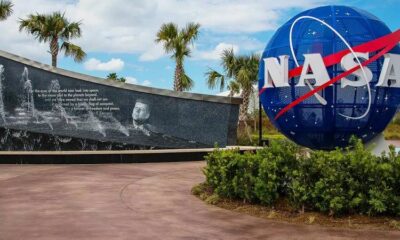Science
Amazon will launch the first two prototype internet satellites for the Project Kuiper constellation in 2022

Amazon expects to launch the first two prototype satellites for its gigantic Project Kuiper broadband constellation in the fourth quarter Q4 of 2022, which would be almost four years after SpaceX launched its first prototype Starlink satellites.
The two spacecraft, known as KuiperSat-1 and KuiperSat-2, will take off from Florida’s Cape Canaveral Space Force Station by the fourth quarter of next year if all works out as expected, the organization declared today (Nov. 1).
The duo will test key technology for Project Kuiper, a constellation in low Earth orbit (LEO) that Amazon imagines comprising of more than 3,200 satellites eventually.
The technology giant filed a request with the Federal Communications Commission to launch and work its first two prototype satellites, called KuiperSat-1 and KuiperSat-2. Amazon said the satellites will launch with ABL Space on its RS1 rocket.
“We’ve invented lots of new technology to meet our cost and performance targets for Project Kuiper. All of the systems are testing well in simulated and lab settings, and we’ll soon be ready to see how they perform in space,” Rajeev Badyal, vice president of technology for Project Kuiper, said in a statement.
“There is no substitute for on-orbit testing, and we expect to learn a lot given the complexity and risk of operating in such a challenging environment,” Badyal said. “We can’t wait to get started.”
Project Kuiper is Amazon’s plan to build a network of 3,236 satellites in low Earth orbit to give high-speed internet to anyplace in the world. The FCC last year approved Amazon’s system, which the organization says it plans to “invest more than $10 billion” in Kuiper. Early service from Kuiper is set to start once Amazon has 578 satellites in orbit.
Amazon last week declared a partnership with Verizon, to work together with the telecom giant in the undeniably competitive field of high-speed satellite internet.
Kuiper is ready to go head to head with SpaceX’s Starlink network, which is the furthest along in the most recent generation of broadband satellite systems. A variety of other networks are in different stages of development, including those of British-owned OneWeb, BlackRock-backed Astranis, satellite-to-smartphone expert AST SpaceMobile, Lockheed Martin’s partnership with start-up Omnispace, and Canadian satellite operator Telesat’s Lightspeed.
The Project Kuiper team has developed consistently at Amazon, which currently has more than 750 individuals and “hundreds more” expected to be recruited in the next year. Amazon built a 219,000 square-foot facility in Redmond, Washington to test and produce the satellites, and plans to add another 20,000 square-foot facilities.
KuiperSat-1 and KuiperSat-2 will reach orbit through the RS1, a new rocket developed by California-based ABL Space Systems. Amazon likewise reported today that it has signed a multi-launch deal with ABL to give these early Project Kuiper launches.
The 88-foot-tall (27 meters) RS1 is capable of launching 2,975 pounds (1,350 kilograms) of payload to LEO, as indicated by its ABL specifications page. ABL is charging $12 million for each launch of the two-stage rocket. The RS1 has not flown yet, yet ABL has said that it aims to direct a debut launch from Alaska’s Pacific Spaceport Complex before the finish of 2021.
Earlier this year, Amazon declared that it had signed a deal with United Launch Alliance, whose Atlas V rocket will loft operational Project Kuiper create on nine different launches.
Project Kuiper isn’t the only planned broadband constellation underway. For example, SpaceX has already launched more than 1,700 spacecraft for its Starlink network, which could ultimately incorporate a huge number of satellites. Also, OneWeb has lofted more than half of the 648 spacecraft that will make up its initial constellation.
Such megaconstellation plans worry dark-sky advocates and professional astronomers, who have been surprised and dismayed by the brightness of SpaceX’s Starlink satellites. Amazon says it will go to lengths to minimize the effect that Project Kuiper has on the night sky.
“For example, one of the two prototype satellites will include a sunshade to help us understand whether it is an effective way to reduce reflectivity and mitigate its impact on ground-based optical telescopes,” company representatives wrote in the same statement. “We will collect data to compare reflectivity between the two spacecraft and share any learnings with the astronomy community following the mission.”
This most recent declaration from Kuiper comes a week after the organization declared a partnership with Verizon to extend the carrier’s 4G/LTE and 5G coverage to more underserved regions. Such a deal depends on Kuiper launching its satellites first.
Amazon intends to invest at least $10 billion in Project Kuiper. The e-commerce giant said last April it had protected an agreement with United Launch Alliance for nine launches. Amazon SVP of Devices & Services David Limp said during last year’s TC Sessions: Space that the organization will look for various launch providers for the project.
Amazon intends to send up the satellites on discrete ABL launches, which will take off from Cape Canaveral Space Force Station in Florida. The organizations have been cooperating “for several months,” Amazon said, with two design reviews complete.
The deal with ABL is the second Amazon has signed with a launch provider, having earlier this year contracted United Launch Alliance for nine Kuiper launches.
-

 Gadget4 weeks ago
Gadget4 weeks agoAfter Grand Success on BLDC Ceiling Fan, Eff4 Is Launching Smart Bulb
-

 Business3 weeks ago
Business3 weeks agoPrakash and Kamal Hinduja: Driving Social and Environmental Change
-
Education4 weeks ago
Fred DuVal: University Leadership as a Critical Resource for Climate Change Research and Life-Saving Solutions
-

 Health3 weeks ago
Health3 weeks agoThe Hinduja Brothers Commitment to Global Health: Empowering Communities Across Borders
-

 Cryptocurrency3 weeks ago
Cryptocurrency3 weeks agoDesigned For The Masses: How Akasha (AK1111) Is Unlocking Crypto For The Next Billion Users
-

 Cryptocurrency4 weeks ago
Cryptocurrency4 weeks agoNexaglobal & Future World Token (FWT): Could This Be the Next Big Crypto Investment of 2025?
-

 Sports4 weeks ago
Sports4 weeks agoWomen’s NCAA Tournament 2025 Sweet 16: Full Schedule, Fixtures, Teams, Bracket, and How to Watch March Madness Basketball Match Live
-

 Startup1 week ago
Startup1 week agoCost-Saving Strategies Every Small Business Owner Should Know to Boost Efficiency

























